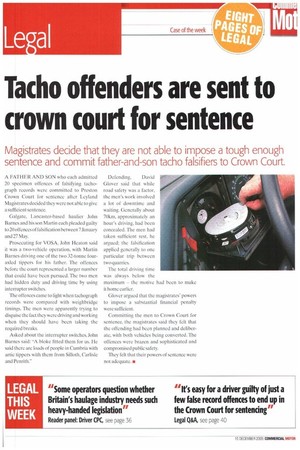Tad° offenders are sent to crown court for sentence
Page 33

If you've noticed an error in this article please click here to report it so we can fix it.
Magistrates decide that they are not able to impose a tough enough sentence and commit father-and-son tacho falsifiers to Crown Court
A FATHER AND SON who each admitted 20 specimen offences of falsifying tachograph records were committed to Preston Crown Court for sentence after Leyland Magistrates decided they were not able to give a sufficient sentence.
Galgate, Lancaster-based haulier John Barnes and his son Martin each pleaded guilty to 20 offences of falsification between 7 January and 27 May.
Prosecuting for VOSA, John Heaton said it was a two-vehicle operation, with Martin Barnes driving one of the two 32-tonne fouraxled tippers for his father. The offences before the court represented a larger number that could have been pursued. The two men had hidden duty and driving time by using interrupter switches The offences came to light when tachograph records were compared with weighbridge timings. The men were apparently trying to disguise the fact they were driving and working when they should have been taking the required breaks.
Asked about the interrupter switches, John Barnes said: -A bloke fitted them for us. He said there are loads of people in Cumbria with artic.tippers with them from Silloth, Carlisle and Penrith." Defending, David Glover said that while road safety was a factor, the men's work involved a lot of downtime and waiting. Generally about 70km, approximately an hour's driving, had been concealed. The men had taken sufficient rest, be argued; the falsification applied generally to one particular trip between two quarries.
The total driving time was always below the maximum the motive had been to make it home earlier.
Glover argued that the magistrates' powers to impose a substantial financial penalty were sufficient.
Committing the men to Crown Court for sentence, the magistrates said they felt that the offending had been planned and deliberate, with both vehicles being converted. The offences were brazen and sophisticated and compromised public safety.
They felt that their powers of sentence were not adequate. •






















































































































































































